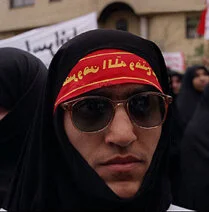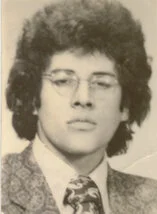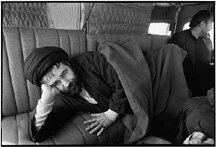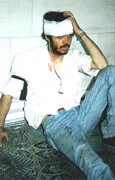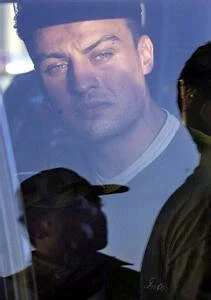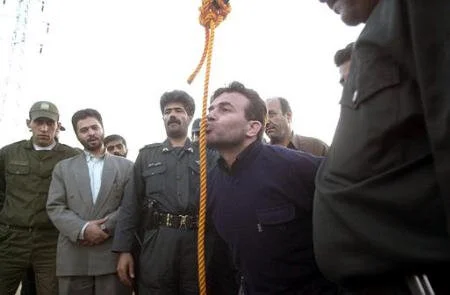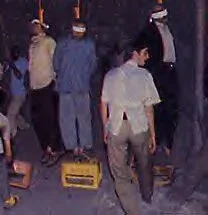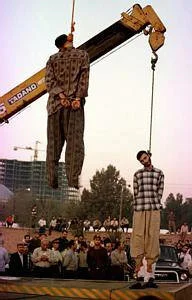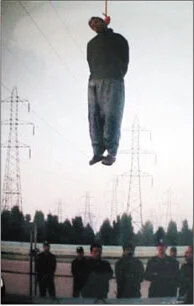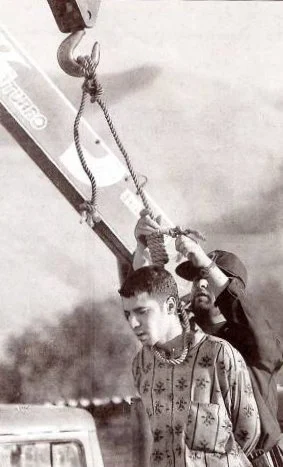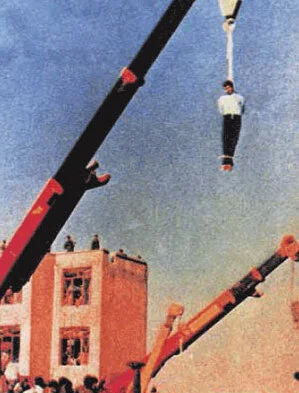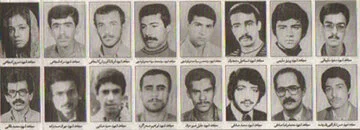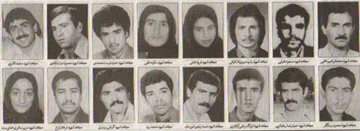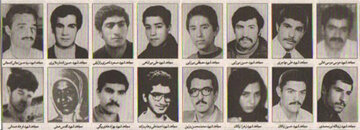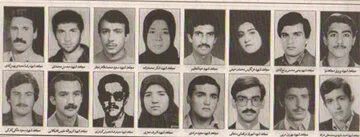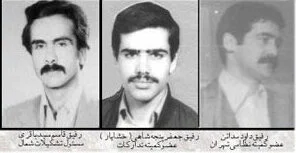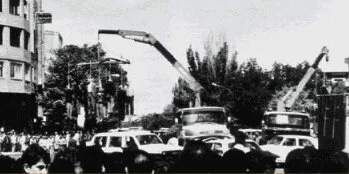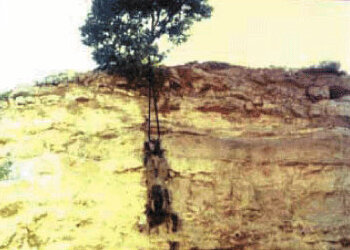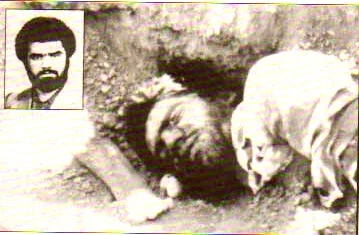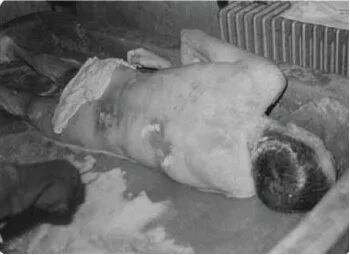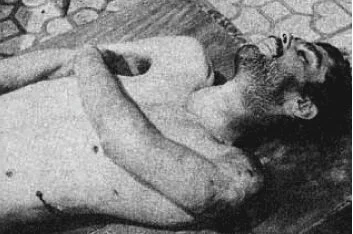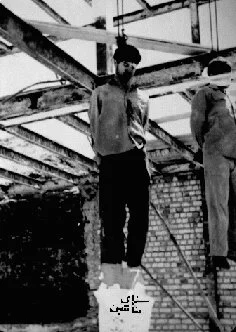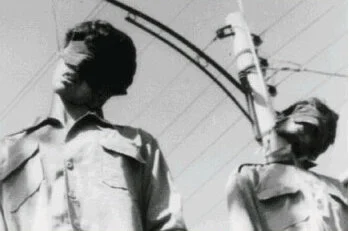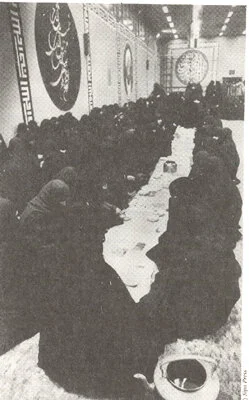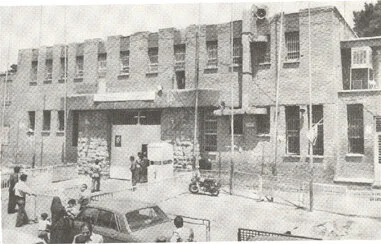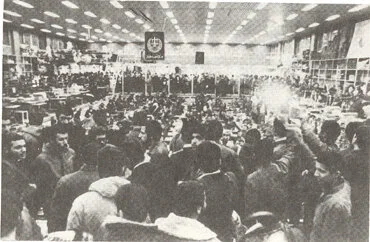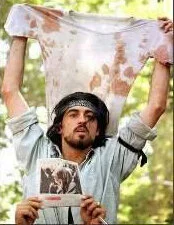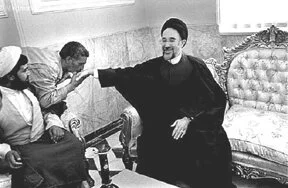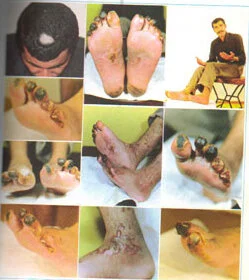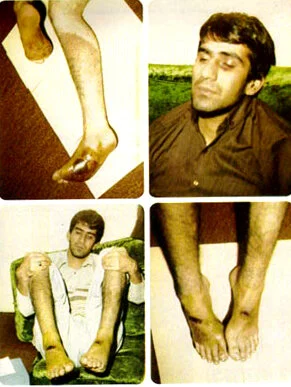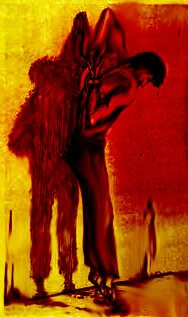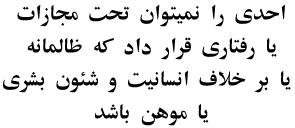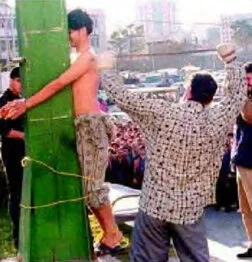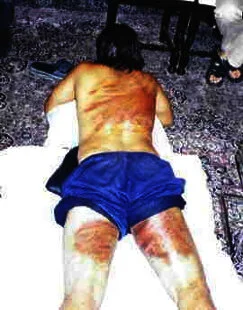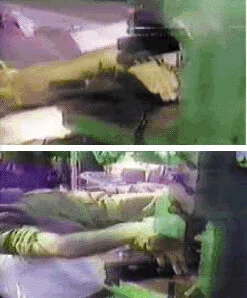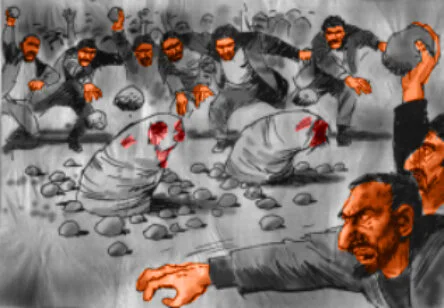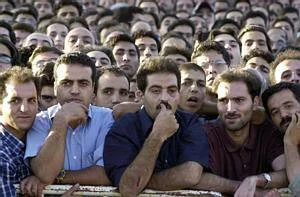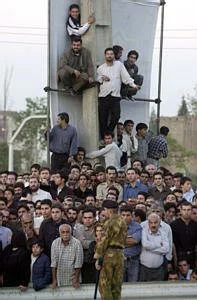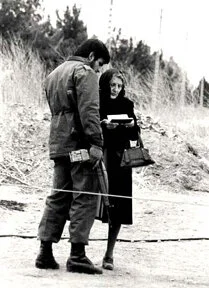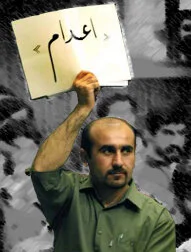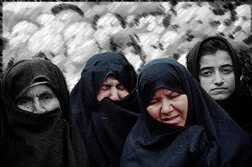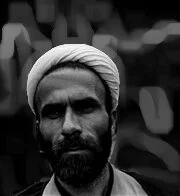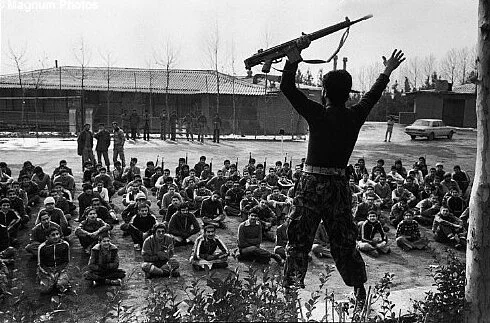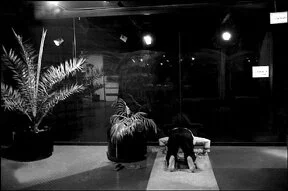
Under the tyranny of the Islamic Republic
1- All human beings are NOT born free and equal in dignity and rights...
2- People are NOT entitled to Human Rights...
3- People do NOT have the right to life...
4- People do NOT have the right to liberty...
5- People do NOT have the right to security...
6- People do NOT have the right to freedom from slavery...
7- People are subjected to torture...
8- People are subjected to cruel, inhuman and degrading treatment and punishment
9- People are subjected to arbitrary arrest and detention...
10- All are NOT equal before the law...
11- Everyone is NOT entitled to a fair trial
12- Everyone does NOT have the right to own property...
All human beings are born free and equal in dignity and rights...
Everyone is entitled to all the rights and freedoms listed in the Universal Declaration of Human Rights, no matter what religion they practice or what views they hold...
The 17 year-old Mona was executed by the Islamic Republic because she did not renounce Bahaism
Religious minorities have been victims of human rights violations in Iran. Bahaism is not even recognized as a religion by the Islamic Republic and the government has continued to pursue a deliberate campaign to promote, sponsor and commit crimes against Iranians who profess Bahaism as their faith. Armenians have also suffered varying degrees of officially sanctioned discrimination, mainly in the areas of employment and education, based solely on the belief in Islam's superiority to other religions. The Armenian-owned Coca-Cola company, for example, was confiscated by the government and all Armenian workers at production levels were fired, with a few remaining Armenians in the company being limited to work at clerical levels. This was mainly due to the Islamic belief that non-Moslems are "unclean" and should therefore not come into direct contact with any product that a Moslem may consume.
Widespread discrimination against the non-Moslems has also continued in the area of education where the government has required all student applicants to pass certain exams in Islamic theology in order to gain admission to institutions of higher education and universities. There are also various "character exams" that grade a student's commitment to the Islamic values of the revolution and the government and which are basically designed to deny non-Moslems equal access to the educational facilities in the country.
Everyone has the Right to Life…
Thousands of people have been executed in Iran since 1979. Many have died after summary trials, lasting only a few minutes, simply because the authorities believed they belonged to opposition organizations. Members of the opposition groups risked not only their own lives, but also those of their relatives and friends.
Everyone has the Right to Liberty
There are many thousands of political prisoners and prisoners of conscience in Iran, including writers, journalists, doctors, lawyers, lecturers, teachers, students and people from the entire political spectrum, ranging from the members of the communist party to the right-wing nationalists. There have been occasions where hundreds of people were officially arrested at once. Relatives of political activists have often been held hostage until the suspects are found, or to apply pressure on individuals that are already in prison.
Everyone has the right to Security of Person...
Where the individual's security is concerned, nobody is safe from arbitrary arrests and ill-treatments by the Islamic thugs- the chain and club wielding gangs of Bassij and Revolutionary Guards; the Zeinab's Sisters and the Komiteh members who consider themselves to be on a mission from Allah and above all civil laws; and all the others who were trained by the Palestinians and who are foreigners to Iran and everything that Iranians believe in. These people basically rule in the streets of Iran's cities. They insult, humiliate, beat up or arrest anyone at will, simply because they can impose their will.
Right to Freedom from Slavery
"And Allah has favored some of you above others in wealth and properties. Now those who are more favored will by no means hand over their wealth and properties to the slaves that their right hands possess..." AN NAHL (16:71)
"...slave under the possession of another; he has no power of any sort..." AN NAHL (16:75)
Slavery exists as an Islamic institution and, in adopting Islamic laws and Islamic values, the Islamic Republic of Iran has, in effect, adopted slavery as an institution. Islamic leaders, including prophet Mohammad himself, have been known to have kept slaves. There are hundreds of Hadith that deal with slavery, and Islamic jurisprudence has laid down detailed regulations for the proper treatment of slaves by their owners and the society. There are laws, for example, that state how a Muslim cannot be put to death for murdering a slave; laws that state how the testimony of a slave is not admissible in court; or laws that make it lawful for a Muslim to keep a girl as his slave and to have sex with her at anytime that he should wish it.
No one shall be subjected to torture...
Torture, both physical and psychological, has been a matter of routine and a common practice in the prisons of the Islamic Republic. Many methods of physical torture and ill-treatment have been described by former prisoners. One example is the blindfolding of detainees, binding their wrists and pushing them violently from one guard to another, while kicking, punching and beating the victim indiscriminately all over the body. Many suffer from various kidney disorders due to these beatings and many more have been scarred for life due to wounds sustained through various other forms of torture, such as applying lighted cigarettes to burn the body and the removal of the toe nails.
Beating and suspension are the forms of torture most often used in the prisons of the Islamic Republic.
"The Revolutionary Guards put me in handcuffs which got tighter as I moved my hands. They were fastened behind my back, diagonally, one arm stretched over the shoulder and the other under.... They suspended me from a hook on the wall with only the tips of my toes touching the ground... My feet had also been beaten and they were swollen and very painful. Gradually, as my legs became tired, my body slumped down and the pressure on my shoulders began. This happens after only a few minutes..." from a man who was arrested at his home and taken to prison in Tehran.
Beating is usually on the back, from the nape of the neck to the back of the thighs, and on the soles of the feet.
"They blindfolded me and wrapped a blanket around my head, so I could see absolutely nothing. The lashes tore into the flesh on the soles of my feet, and I lost consciousness several times..." from a 16 year old girl who was taken to Evin prison for interrogation.
Sexual abuse of both male and female prisoners, including rape, is also practiced widely in the prisons of the Islamic Republic. Young women prisoners have been forced into temporary marriages with the members of the Revolutionary Guards and have subsequently been raped the night before their execution. This is being done because it is written in the Koran that the soul of virgins will go to heaven, hence the practice of temporary marriage and rape before execution in order to avoid sending the victim to heaven. Furthermore, in compliance with Islamic rules and values, the families of the young victims of rape and murder will also have to suffer the additional burden of accepting the "bride money" from the hand of the same Islamic Guard who was responsible for the raping and the killing of their daughter. The wives and the daughters of the male prisoners have also been victims of "temporary marriages" and rape by the Islamic Guards. The Guards themselves have often boasted about such acts to the male prisoners.
The other forms of torture that have been committed by the Islamic Republic include the infliction of psychological suffering by carrying out mock executions and by forcing prisoners to witness the torture and execution of their close relatives or political colleagues.
"They took me to a yard where there were four wooden posts in a semi-circle, and they tied each of us to a post. The first was a boy of 14 or 15, a member of the Mojahedine organization. The second was an army officer and the third, aged about 23, was a member of Paykar. I was the fourth. The time before, when they asked if I had a last wish, I asked them to remove my blindfold, so this time they did not blindfold me. I saw the bullet hit the boy and the officer was hit in the stomach. The Peykar man may already have been dead, his body didn't react to the bullet. The young boy was shaking violently with a bullet in his body. His hands were tied and he was trying with all his might to free himself. He was bleeding profusely. I shouted "what are you waiting for? Why don't you shoot me?" They laughed, and I could do nothing. The young boy died, then the officer. I had just stood there and watched them suffering..." From a prisoner who described his experience in the prison of the Islamic Republic.
More often than not, these psychological and physical tortures are followed by the death of the victims. Sometimes the victims suffer death under torture. At other times, however, the victims are killed after lengthy sessions of torture, simply because the practice does not yield the anticipated results to the revolutionary guards. A young woman prisoner, for example, who had been imprisoned in Shiraz on the ground of being a Bahaie that refused to recant her faith, was taken by the Islamic guards to see the tortured body of her dyeing husband, who was also refusing to renounce his faith. Having suffered all the agony and torture because of their refusal to renounce their faith, the husband and wife were both executed by the Islamic Republic.
No one shall be subjected to cruel, inhuman or degrading treatment or punishment.
The Islamic Republic's record on Human Rights abuses is apparent in the forms of punishment that are prescribed by the clergy and carried out in public by the Judicial Police, the Islamic Guards and sometimes the public. These punishments range from the most ridiculous that requires vandals to ride around their neighborhood on donkeys, facing backwards, to the most outrageous and unforgiving practice of the public stoning of adulterers to death. Public hangings and floggings, the cutting off of the hands, amd the gouging of the eyes are but a few examples of the cruel and inhuman punishments that have been practiced under the rule of the Islamic Republic. Aside from the above there is also the Islamic ground for crucifixion, which is perhaps the most shocking and outrageous punishment of all. Although an actual case of crucifixion happening has yet to be recorded in Iran, yet it must be of concern to all Human Rights advocates that such a practice is still considered to be a legal form of punishment, in that it is institutionalized in the Penal Code of the Islamic Republic. The laws, outlined below, make it clear that the purpose of crucifixion is to inflict severe pain which may lead to death:
"The curcifixion of a Mohareb and Mofsed fil Arz shall be carried out by observing the following conditions:
1- The manner of tying does not cause the death
2- The person being crucified does not remain on the cross for more than three days; but if he dies during the three days he may be brought down after his death
3- If he remains alive after three days, he must not be killed
It is also important to note that the victims of these outrageous practices are not only those offenders who are the subjects of these punishments, but also the general public who are forced into having to accept these laws in the first place, and who are then further brutalized in having to witness and participate in the administration of the cruel punishments that are prescribed by such laws.
No one shall be subjected to arbitrary arrest or detention
The agents of the Islamic Republic engage in the routine practice of arresting the relatives of political activists, either as hostages until the suspects are found, or to apply pressure on individuals already in prison.
"The Revolutionary Guards came to our home in in Isphahan. They were looking for my husband but had no warrant with them and my husband had already managed to leave the country. When they couldn't find my husband they said that they just wanted to take me for a couple of hours to ask me a few questions. My father and younger sister, aged 19, were taken along too, but they were released after six hours. I remained in prison for 14 months..." From the wife of a suspected political activist.
There have been cases where the suspect's wife has been sentenced to years of imprisonment, being eligible for parole only upon the finding of her husband. There have also been cases where entire families were rounded up:
"The Revolutionary Guards came to our home and searched it. My father, mother, sister and younger brother were there and they locked them in a room together. When I got home my brother had also just returned and neither of us knew what was going on. Our house had a cellar and they took the two of us there and beat us up. There were 10 or 12 of them. Then they took the whole family to the Revolutionary Guards headquarters in Orumiyeh..."
Many are taken into custody from their homes "to answer some questions, which may require their presence for a few hours." Once they are taken in, however, they may be held by the Guards for many months, or even years. It could take weeks, or months before the detainees are even told the reason for their arrest. People can get arrested simply because their names have been mentioned under torture by friends, relatives or colleagues. There are even cases where people have been arrested by mistake because their names were similar to those of political activists sought by the Revolutionary Guards.
It is not uncommon for families to search for a "missing" relative for months, going from Revolutionary Guard Centers and Komitehs, to various prisons and detention centers all over the town. When the authorities cannot deny that someone is being held at a particular center, the Islamic Guards resort to insulting the family members of the detainees, warning them not to make inquiries, by threatening them to face the consequence of being imprisoned themselves.
All are equal before the law...
Testimony of One Man = Testimony of Two Women
The Penal Code of the Islamic Republic states that compensation for the murder of a Muslim woman is half that for the murder of a Muslim man. The testimony of women is also taken to be less valuable than that of men. Murder, for example, is proved by the testimonies of "two righteous males, or one righteous male and two righteous females."
Discrimination on religious grounds has been demonstrated by trials of members of the Bahaie faith. Some examples of such trials are as follows:
Case 1: A Muslim man who had killed a Bahaie with a "premeditated blow" was not prosecuted by the courts of the Islamic Republic, nor could any retribution be claimed by the victim's family, because they were Bahaies.
Case 2: A Muslim who had killed a Bahaie in a traffic accident was judged guilty of manslaughter, but under no obligation to the victim's family because of their faith.
Everyone is entitled to a fair and public hearing by an independent and impartial tribunal...
The following are the circumstances under which many political defendants have been tried in the courts of the Islamic Republic;
The defendants had no access to defense counsel in the courts, where no one could help or speak for them.
The defendants were not allowed to present any evidence in their defense.
The defendants were not told in advance what the charges against them were.
Their trials were held in secret.
Their cases were heard and tried by a single judge.
The individual judges presiding over the trials have often been young and inexperienced Mullahs who were lacking in proper legal training.
Their cases were often heard in trials that were summary in the extreme, with some cases having been completed within a matter of a few minutes- with the defendant's life being at stake.
"Confessions" extracted from the defendants under torture and ill-treatment have often been the sole evidence presented against the defendants at the trials.
The defendants who had been sentenced had no right of appeal or avenue of redress.
The following are two testimonies that illustrate the unfair nature of some of the trials that have been held in courts of the Islamic Republic:
"I was taken to a building called the court where there was a mullah behind a desk who must have been in his early twenties. There were four chairs on one side of the room and I sat down there with three other women. None of us had anything in common politically, each of us had been arrested for different reasons.
We gave our names one by one and were each asked which organization we had been arrested in connection with and what our political activities were. I said that I was arrested because they couldn't find my husband, and another woman said she had been at a party and had no political affiliations at all.
The court convened for no more than five minutes. There was no one else in the room, but there were interruptions the whole time. After five minutes we were told to leave the room and there were no further questions." From the testimony of a woman held in Evin and Gohar Dash prisons for months.
"I went to court and the Mullah read out a list of 25 charges against me. The Mullah said that I had confessed to all of them. The charges included belonging to Peykar, opposition to Khomeini and attempting to brainwash my students.
When the Mullah asked me if I had anything to say in my defense, I denied all the charges, saying they had been fabricated. The Mullah said he knew that my entire family were members of Peykar and that I deserved to be executed, but in order to show me that Islam is merciful he sentenced me to life imprisonment. He said there were witnesses who could testify against me, but when I asked to see them I was returned to my cell.
Later when I received the official notification of my sentence, it stated that I had been given 15 years' imprisonment." From the testimony of a man arrested in 1981.
No one shall be arbitrarily deprived of his property...
Immediately after the Islamic Revolution, on March 12, 1979, the Mostazafin Foundation was formed by the Revolutionary Council to find and confiscate the properties of all the wealthy people who were associated with the previous regime. This foundation, together with various other revolutionary organizations like it, have managed to confiscate billions of dollars worth of wealth and property that was privately owned and managed by the people of Iran. The foundation is now managing over 400 companies and factories, with an annual turn over of over $3.6 billion. It is important to note that a lot of this wealth has always been channeled to the private bank accounts of the Mullahs who have been associated with the Islamic Regime, or it has been used to support terrorist organizations and their activities in other countries. Some money has been set aside to keep the "down trodden" and the club-wielding "volunteers" on the payroll of the Islamic Republic. The original victims of this takeover that took place immediately after the Islamic Revolution included, but were not limited to the following:
51 industrialists and manufacturers
15 major insurance companies
29 private banks with holdings in excess of 169 billion Rials
The people who were executed and their families
Anyone who opposed the Islamic Republic


